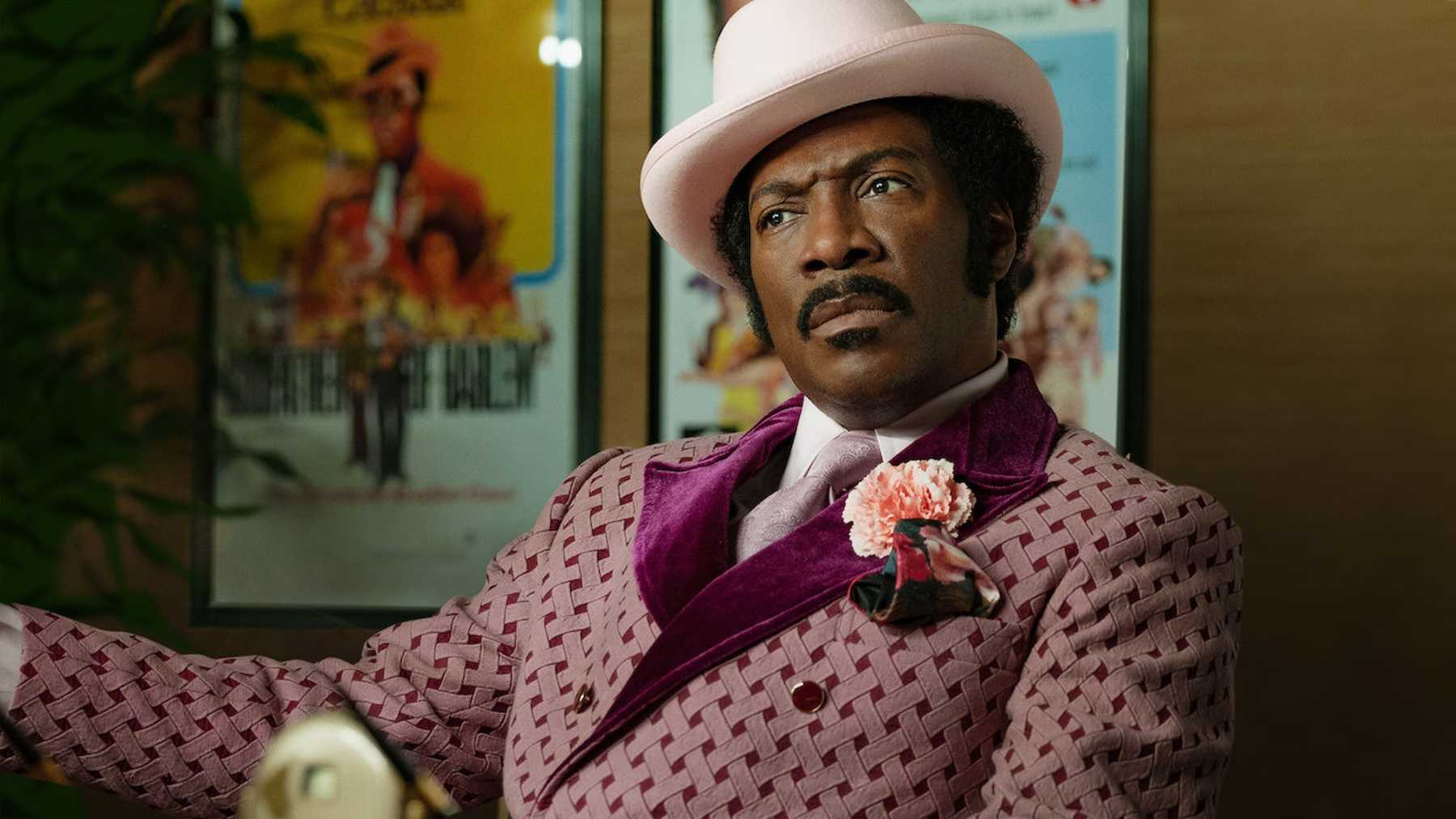Screenwriters Scott Alexander and Larry Karaszewski have a soft spot for pop culture’s underdogs and their struggles to gain legitimacy. They wrote the screenplays for the movies Ed Wood, The People vs. Larry Flynt, Man on the Moon, and Big Eyes – all films about talents battling to be taken seriously. Even with The People vs. O.J. Simpson miniseries, their foray into television, the story focused on the meager DA’s office pitted against The Juice’s “Dream Team.” Alexander and Karaszewski love David’s battling Goliath’s, and with their new film Dolemite Is My Name, they’ve found one of their scrappiest fighters yet.
This time, their underdog is Rudy Ray Moore (Eddie Murphy), a comedy and rap pioneer from the 1970s, who fought tooth and nail to become a contender on the standup stage, in the recording business, and on the silver screen. Yes, this is a biopic, similar to those other stories, and in Moore, Alexander and Karaszewski have one of their most fascinating, real-life personalities as the protagonist.
As the film starts, it’s 1970 and Moore is stuck working in a record store in Los Angeles. Once an aspiring singer, he’s fallen on hard times. He’s cresting into fifty, overweight, and he can’t even get the store’s DJ (Snoop Dogg) to play his 45’s from the 50s. Then, Moore gets inspired by a homeless man who spouts raunchy jokes through rhyme. Moore decides to create a standup character named Dolemite, parlaying the vagabond’s material into an act. Suddenly, his trash-talking, pseudo-pimp persona dressed in velvet and carrying a cane, becomes a club fixture and even leads to a record deal.

The screenplay by Alexander and Karaszewski delights in not only showing off Moore’s naughty rhymes but more importantly, in the delight that Moore feels at being beloved. The screenplay also details the specifics of how Moore climbed out of poverty through creating everything from his routines to his X-rated album covers to his standup tour through the South.
Wise men will tell you the journey is more important than the destination, and that’s true in scripts, and Moore’s life story. In fact, all three dovetail together in Dolemite Is My Name as Alexander and Karaszewski make Moore’s trajectory the story, citing specific incidents and game-changing events that molded the man on his way towards his dream. One of those moments occurs when Moore helps “Lady Reed,” a struggling single mom (Da’Vine Joy Randolph) he meets at a club turn into a sassy standup herself. Moore may be focused on his own fame, but his heart is big enough to invite others along for the ride.
In fact, the core relationship in the film isn’t Moore’s with his crew from LA (Mike Epps, Tituss Burgess, and Craig Robinson), it’s the friendship he fosters with Lady Reed. Not only does the story illuminate how Moore helped her develop her stage persona, but how their relationship built during it, a platonic one that lasted all the way into the production of Moore’s big-screen production showcasing his Dolemite character.

Mike Epps and Wesley Snipes
Murphy has always been hilarious, and he’s wonderful here playing Moore and his alter ego. But as many laughs as he gets through the run of the film, what you’ll remember most are the heartfelt moments. He’s taken what Alexander and Karaszewski have written and turned Moore’s vulnerable moments into the highlights of the film. Murphy lets us see how every insult hurled at Moore hurt him, yet the actor always shows how the man uses such naysaying to inspire him. The wheels are always turning in Moore’s head, and in Murphy’s eyes, as he thinks of new ways to rise above the negativity and obstacles.
That’s especially true when Moore gets his opportunity to turn Dolemite into a film. He writes the script with the help of a serious playwright (Keegan-Michael Key, always great playing exasperation), secures production funding, and even hires a vain ‘name actor’ to direct. Wesley Snipes plays that thespian, D’Urville Martin, and his hilarious performance nicely riffs on fragile Hollywood egos. Moore also procures a dilapidated hotel to shoot in and house the crew, as well as cajole all of his friends from the old neighborhood to work in front of the camera and behind it as well.
What Moore et al. create is a crass cheapie capitalizing on the Blaxploitation movie market of the 70s entitled Dolemite with Moore’s pimp character evolving into a Kung-Fu-fighting, jive-talking, ladies’ man taking on the mob. And as the second hour plays out, the story shows how the production of Moore’s film turned out to be an amateurishly acted, ineptly shot, and crudely edited turkey. Yet, it was all Moore’s, and he loved it.
Director Craig Brewer never pushes too hard, knowing full well that the characters are already larger-than-life, ones not needing any goosing from the camera or editing. Instead, he lets Moore’s heart, and in turn, Alexander’s and Karaszewski’s, prevail in this sweet and moving biography. Brewer nails the period too, as well as Quentin Tarantino did in Once Upon a Time in Hollywood, with Ruth E. Carter’s period costumes standing out as the most striking of any onscreen this year.
Dolemite is My Name, appearing on select screens for the past few weeks, and about to drop on Netflix Thursday at midnight, is a period piece that has a lot to say about our modern times. It’s a rallying cry to fight the power, reinvent yourself to be happy, and realize it takes a village to move mountains. Perhaps most cleverly, it’s a primer for filmmakers out there. Alexander, Karaszewski, Brewer, et al. are telling those trying to make it in the biz to make it themselves. Crowd-source, shoot outside the studio system, stick to your vision – good advice for anyone, but especially those chasing the Tinsel Town dream, just as Moore did in his day.
